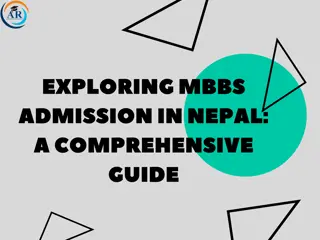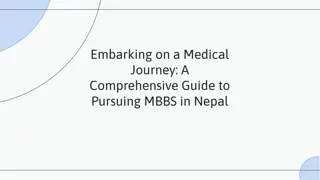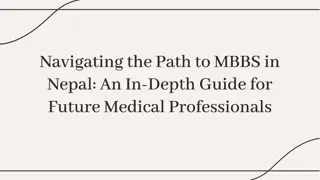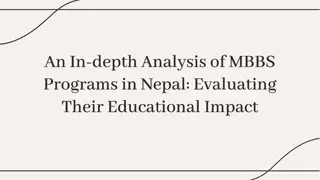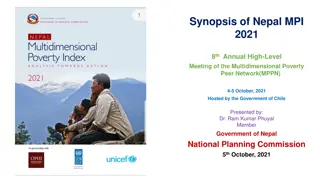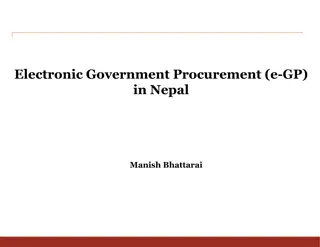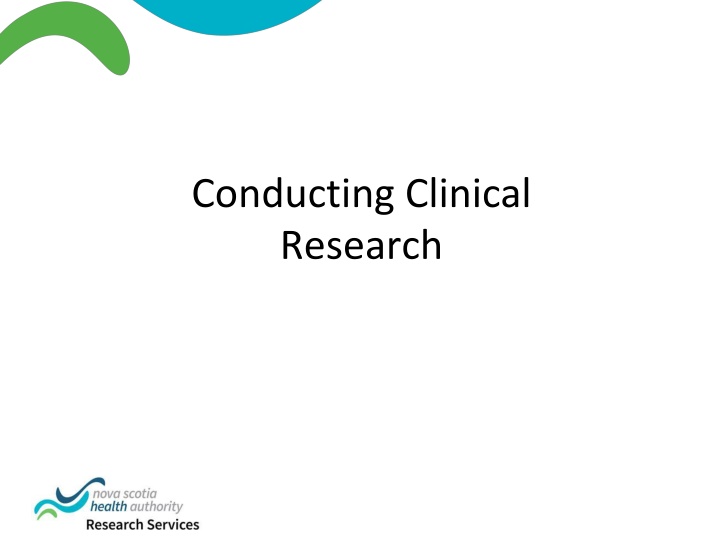
Clinical Research and Trials
Clinical research involves conducting trials with human subjects, requiring a dedicated research team and adherence to regulatory guidelines. This process can be time-consuming but ultimately rewarding. Clinical trials progress through phases, from testing safety to comparing new treatments with standard therapies. An essential aspect is the involvement of a Research Ethics Board (REB) to ensure scientific validity and participant safety.
Download Presentation

Please find below an Image/Link to download the presentation.
The content on the website is provided AS IS for your information and personal use only. It may not be sold, licensed, or shared on other websites without obtaining consent from the author. If you encounter any issues during the download, it is possible that the publisher has removed the file from their server.
You are allowed to download the files provided on this website for personal or commercial use, subject to the condition that they are used lawfully. All files are the property of their respective owners.
The content on the website is provided AS IS for your information and personal use only. It may not be sold, licensed, or shared on other websites without obtaining consent from the author.
E N D
Presentation Transcript
Conducting Clinical Research
Clinical Research Broad Term Involving human subjects Clinical Trials one aspect of clinical research Infrastructure Required Investigator Research Team RNs, data coordinators, pharmacists, administration REB Financial/Legal Quality/Audit Education
Conducting Clinical Research Very time consuming A lot of administrative/regulatory issues Very rewarding
Conducting Clinical Trials Review Types of Clinical Trials Role of the REB Research Requirements ICH/GCP Guidelines 4
Clinical Trials Phase I Brand new drug X Goal Is it safe/what is the dose? (Maximum Tolerated Dose MTD) Phase II Test drug X at MTD in different diseases Goal Efficacy = does drug X work Continue to look for safety signals Phase III Compare drug X with the previous standard therapy Goal Determine if drug X better, equivalent or non inferior to standard treatment
Clinical Trials Phase III Normally start with testing in patients with no/limited options (metastatic disease, e.g. 3rd line chemotherapy for colon cancer) If effective, then move into 1st or 2nd line metastatic If effective, then move into adjuvant setting 6
Research Ethics Board (REB) REB evaluates scientific validity, participant safety and rights. Projects must adhere to ongoing reporting requirements after approval. REB is authorized to suspend or terminate research projects. REB guidance documents are on the http://www.cdha.nshealth.ca/discovery-innovation/discovery- innovation/resources (Pre-submission review with the REB Manager is available upon request.)
Research Ethics Board (REB) Independent board comprised of volunteers that meets specific membership requirements All research projects involving patients, staff, resources or data reviewed and approved by the REB before the research begins. Four working groups with co-chairs; each group meeting monthly
What requires review? Research (systematic data collection) involving: Living participants and/or Human biological materials (e.g., human embryos, fetuses, fetal tissue, reproductive materials, stem cells) NSHA REB Jurisdiction Policy: All human subjects research involving Nova Scotia Health Authority (NSHA) affiliated physicians/scientists, patients, staff, resources and/or data
What doesnt require review? Research involving publicly available information (legally accessible and no expectation of privacy) Observational research in public places Secondary use of anonymous information/biological materials, as long as identifiable information not generated Quality assurance/improvement, program evaluation, performance reviews, educational testing, creative practice
Quality or Research? The ARECCI Screening Tool assists in identification of research vs quality. http://www.aihealthsolutions.ca/arecci/screening/39102/8 b58e64a2dacab4a4507dbe2e5bd4690 (Alberta Research Ethics Community Consensus Initiative) Consultation with the REB Manager is also encouraged. The REB Jurisdiction Policy provides additional suggestions for quality projects
Research Classifications Clinical trial: any research study that prospectively assigns human participants or groups of humans to one or more health-related interventions to evaluate the effects on health outcomes Non-interventional research: research study where the investigator does not prospectively assign a health- related intervention but a systematic evaluation is done of interventions (observational research)
Research Requirements All research conducted in Canada must comply with applicable national, provincial and institutional standards, guidelines and regulations. Determine what applies to your project and understand what is required for compliance. Requirements depend on the type of project and the study intervention.
Tri-Council Policy Statement (TCPS2) Joint policy of the three federal research agencies: CIHR, NSERC and SSHRC Natural Sciences and Engineering Research Council (of Canada) Social Sciences and Humanities Research Council (of Canada) As an institution who receives and administers funds by these agencies, we must ensure that anyone doing research at such an institution complies with TCPS. www.pre.ethics.gc.ca/eng/education/tutorial-didacticiel/ * applies to all research done at NSHA
Privacy Legislation Personal Information International Disclosure Act (PIIDA) Restricts the disclosure of personal information outside Canada, as other countries may not have equivalent data protection laws. Personal information (including participants personal health information (PHI) and researchers CVs) may only be stored or accessed outside Canada with the consent of the individual.
Privacy Legislation Personal Health Information Act (PHIA) Individually identifiable information or information that could reasonably lead to identification of an individual and includes, but is not limited to: Demographic information Health history Payment information Information related to provision of healthcare Donation of body parts/substances Includes recorded and unrecorded information
Canadian Regulations Division 5 regulations Drugs (includes biologics and radiopharmaceuticals ) Natural Health Products and Medical Devices- each have specific regulations ICH-Good Clinical Practice Guidelines all clinical trials involving medication or natural health products
Site and Study Standards Standard Operating Procedures many research teams have standard operating procedures for complex processes essential to research conduct, may be specific to the study or team/site. Compliance is not optional! Research protocol the study standard, compliance is not optional!
Investigator-Initiated Research If the investigator initiates the research by designing the protocol and research plan, the investigator is also the sponsor. A funding agency who is not responsible for initiating the research is not the sponsor. If the trial intervention is a drug, natural health product or medical device, compliance with certain regulations is required.
Investigator-Initiated Research Investigator-sponsors have a different degree of oversight because they assume all the sponsor responsibilities such as complying with applicable regulatory requirements. This is in addition to investigator responsibilities and thus requires additional resources. Consultations are strongly encouraged at the stage of study development. Contact Program Manager, Research Education.
ICH-GCP Training for Investigators & Research Teams Andrea Dean Program Manager, Research Education Nova Scotia Health Authority Nov. 8th, 2017
ICH-GCP E6 International Council for Harmonization: Good Clinical Practices : Consolidated Guidance Compliance with this standard provides public assurance that the rights, safety and well-being of trial subjects are protected and that the clinical trial data are credible.
ICH-GCP History Driven by tragedies, such as that with thalidomide in the 1960s Needed a process for determining the safety and efficacy of medicinal products before they are allowed on the market, while maintaining rights, safety and well being of human subjects Countries began developing guidelines for this process but not standardized
Harmonization Pioneered by the Europeans in the 1980s Europe, Japan and the US most interested in harmonization The birth of ICH (International Conference on Harmonization) took place at a meeting in Brussels, April 1990
Initiation and Evolution Regulatory and pharmaceutical representatives from US, Japan and Europe along with observers from Canada, Australia and the WHO met to develop mutually acceptable GCP guidelines Topics selected for harmonization would be divided into Safety, Quality and Efficacy to reflect the three criteria which are the basis for approving and authorizing new medicinal products
Health Canada and ICH Health Canada, as official observer to and active participant in the International Conference on Harmonization (ICH), is committed to the adoption and implementation of ICH guidance and standards Adopted ICH-GCP in Canada in 1997
Guideline for Good Clinical Practice (ICH GCP E6) International ethical and scientific quality standard for the design and conduct of clinical trials in human subjects as well as for the recording and reporting of clinical trial data Describes the responsibilities and expectations of all individuals involved in the conduct of clinical trials, including investigators, sponsors and REBs. Provides guidance on content of protocol, amendments and investigator s brochure and defines essential documents
When does ICH-GCP apply? Must be followed when generating clinical trial data that are intended to be submitted to regulatory authorities, i.e. clinical trials involving natural health products, drugs, biologics and radiopharmaceuticals. Also applies to phase 4 trials. Recommend following for other clinical investigations that may have an impact on the safety and well-being of human subjects
Anatomy of ICH-GCP E6 1. Glossary 2. Principles 3. Research Ethics Board 4. Investigator 5. Sponsor 6. Clinical Trial Protocol and Amendments 7. Investigator s Brochure 8. Essential Documents
Glossary Term Sponsor: An individual, company, institution or organization with takes responsibility for the initiation, management, and/or financing of a clinical trial (ICH-GCP 1.53) Some of you might be acting in this role as sponsor- investigators and obligations include both those of a sponsor and those of an investigator.
What is the difference between the PI/QI and an Associate/Sub Investigator ? The PI/QI can delegate certain functions but retains overall responsibility for all aspects of the trial at the site. Only one per site. Associate/sub investigators are designated & supervised by the PI/QI to perform critical trial-related procedures and/or to make important trial-related decisions (ICH- GCP 1.56) Can be many per site.
Section 2: Principles 2.1 Ethical conduct of clinical trials: Declaration of Helsinki Good Clinical Practice Regulatory requirements 2.2 Benefits must justify risks. 2.3 Primary concerns are participant rights, safety and well-being. Prevail over scientific interests. 2.4 Adequate supportive data to support trial.
Section 2: Principles 2.5 Protocol is scientifically sound, clear & detailed 2.6 Compliance with REB approved protocol 2.7 Medical care of participants is provided by a qualified physician 2.8 Research team qualified by education, training and experience in their area of responsibility
Section 2: Principles 2.9 Informed consent obtained prior to trial participation. 2.10 Data recorded, handled and stored to enable accurate reporting, interpretation and verification. 2.11Confidentiality maintained as per regulatory requirements.
Section 2: Principles 2.12 Investigational product manufactured, handled and stored in accordance with Good Manufacturing Practices (GMP) and used in accordance with protocol. 2.13 Quality assurance systems and procedures are implemented for every aspect of the trial.
Investigator Responsibilities (Section 4 ICH-GCP) 4.7 Randomization and unblinding 4.8 Informed consent 4.9 Records and reports 4.10 Progress Reports 4.11 Safety Reporting 4.12 Premature trial termination/ suspension 4.13 Final Report 4.1 Qualifications and agreement 4.2 Adequate resources 4.3 Medical care of participants 4.4 REB Communication 4.5 Compliance with Protocol 4.6 Investigational product 39
Investigators Responsibility Principal Investigator is ultimately responsible for the conduct of the trial AND this is evidenced by documentation of personal oversight. Many tasks can be delegated but overall responsibility cannot! Understand the buck stops with the PI.
Documentation of PIs Oversight and Responsibility Responsibility for personal oversight must be documented on/with: QIU and other attestations (as applicable) All agreements/contracts All new information related to the trial Impact of new information on safety of participants Certain REB correspondence Other reports/documents as specified by sponsor.
4.1 Qualifications and Agreements Investigator(s) should be qualified by education, training and experience to assume responsibility to conduct trial and should meet regulatory requirements and should provide evidence of such qualifications as requested by the sponsor, regulatory authorities and/or REB (i.e. up-to-date CV, medical license, applicable training records).
4.1 Qualifications and Agreements The Investigator: Is thoroughly familiar with protocol and investigational product (and this is documented). Awareness and compliance with ICH-GCP and applicable regulatory requirements. Permits monitoring and auditing by the sponsor and inspection by regulatory authority (definitions of these to follow)
Glossary Terms Monitoring: Overseeing the process of the trial, and ensuring it is conducted according to protocol and that SOPs, GCP and other regulatory requirements are being followed (ICG-GCP 1.38) Audit: an independent examination of trial related activities and documents to determine trial is being conducted according to protocol and that SOPs, GCP and other regulatory requirements are being followed (ICH-GCP 1.60) Inspection: an official review of documents, facilities, records and other recourses by a regulatory authority (ICH-GCP 1.29)
Delegation of Activities The PI can delegate many trial related activities to other research team members. However, the PI retains overall accountability for proper conduct of the study. Significant study-related duties must be delegated to appropriate individuals and the PI is responsible to ensure individuals are trained, and keep records of the training. The PI must maintain a list of appropriately qualified persons whom the investigator has delegated significant trial-related duties. (Delegation Log)
Delegation Log All delegated activities must be documented on a delegation log before they are assumed and signed off by the PI Delegation log must be accurate (periodically review and update) Required training must be completed before assuming study tasks.
4.2 Adequate Resources Do I have the time required? Yes Do I have qualified staff and do they have the time? Yes Will I be able to recruit the numbers of participants I need? Yes If there is doubt the study should be refused 47
Protocol Feasibility Assessment Consider: Inclusion and exclusion criteria-clear and unambiguous Contraindicated medications Potential barriers to participants (invasive procedures, time commitment required, convenience of scheduling) Recruitment target and timelines Complexity of study design Adequate planning for recruitment-be involved and don t overestimate
Investigators Time and Commitment The investigator should be prepared for the time required for the conduct and sufficient oversight of trial Additional activities may include attending investigator meetings, identification of participants, spending additional time with participants, meeting with monitor /coordinator, reviewing AEs, SAEs, reviewing all new information related to the trial and so on.
Study Staff Are staff are able to take on a new study without compromising research quality? Are staff experienced and qualified? Are there competing studies? Staff will require additional training on protocol, investigational product and delegated tasks.




